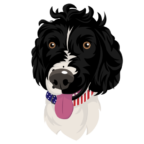Newfoundlands, affectionately known as “Newfies,” have long been admired for their striking appearance and gentle temperament. Hailing from the Canadian island of Newfoundland, these robust working dogs were initially bred to assist fishermen by pulling in heavy fishing nets and rescuing people from the water. With their remarkable swimming abilities and strong work ethic, it’s no surprise that these magnificent dogs have garnered a loyal following of admirers.
In this comprehensive article, we’ll explore the fascinating world of Newfoundlands, delving into their physical characteristics, unique personality traits, and overall health. We’ll also discuss the type of lifestyle that best suits these gentle giants and provide insights into their exercise and grooming needs. Whether you’re a seasoned Newfoundland owner, considering adding one of these lovable dogs to your family, or simply curious about the breed, this article will serve as a valuable resource in understanding these incredible dogs.
Join us as we uncover the magic of Newfoundlands and reveal why they continue to captivate the hearts of dog enthusiasts worldwide. Discover what makes these gentle giants so special, and learn how to provide the love and care they deserve.
Physical Characteristics of Newfoundlands
The physical characteristics of Newfoundlands truly set them apart from other breeds. These gentle giants are known for their imposing size, with males standing between 28 to 30 inches tall and weighing between 130 to 150 pounds, while females typically measure 26 to 28 inches and weigh 100 to 120 pounds. This significant size is accompanied by a sturdy, muscular build that enables them to perform demanding tasks with ease.
Newfoundlands boast a thick, water-resistant double coat that is both functional and beautiful. Their outer coat is long, straight, and coarse, while the undercoat is soft and dense, providing insulation against harsh weather conditions. Coat colors vary, including solid black, brown, and gray, as well as a distinct black-and-white pattern known as Landseer.
The breed’s facial features are equally remarkable, characterized by a broad head, expressive eyes, and a strong, square muzzle. Their floppy ears and sweet, soulful expressions only add to their undeniable charm. Despite their substantial size, Newfoundlands carry themselves with grace and poise, effortlessly capturing the admiration of all who encounter them. In summary, the physical traits of these majestic dogs are not only visually stunning but also serve practical purposes, making them perfectly suited for their historical roles as working dogs and devoted companions.
Personality Traits and Temperament
Newfoundlands are renowned for their gentle and loving temperament, which is often surprising to those who encounter these large dogs for the first time. Their calm, patient nature makes them wonderful companions for families, and they are particularly well-suited for households with children. In fact, their exceptional affinity for kids has earned them the nickname “nanny dog,” as they are known to watch over little ones with great care and attentiveness. A famous “nanny” Newfoundland is ‘Nana’ from Peter Pan.
Intelligence is another hallmark of the breed, making Newfoundlands highly trainable and eager to learn. They respond best to positive reinforcement techniques and are always eager to please their owners. This intellectual capacity, combined with their innate desire to help, means they excel in a variety of canine activities, such as obedience training, therapy work, and search and rescue missions.
Despite their size, Newfoundlands are incredibly adaptable, able to adjust to various living situations as long as their physical and emotional needs are met. They are innately sociable dogs, forming strong bonds with their families and getting along well with other pets. The breed’s loyalty and devotion to its human companions are unparalleled, with many owners describing their Newfoundlands as “gentle giants” with hearts as big as their bodies. The combination of their tender nature, intelligence, and adaptability make these magnificent dogs a truly exceptional breed, beloved by all who have the pleasure of knowing them.
Health and Lifespan of Newfoundlands
Newfoundlands, like many large dog breeds, are susceptible to certain health issues that potential owners should be aware of. With proper care and attention, however, these gentle giants can enjoy a lifespan of 8 to 10 years.
One common health concern in Newfoundlands is hip dysplasia and elbow dysplasia, which results from abnormal development of the hip or elbow joints. This condition can lead to pain, inflammation, and arthritis, affecting the dog’s mobility and quality of life. Regular veterinary check-ups and early detection can help manage these issues and prevent severe complications.
Another health risk for the breed is heart problems, particularly subaortic stenosis (SAS), a congenital defect that restricts blood flow from the heart. Symptoms can range from mild to severe, and in some cases, SAS may lead to sudden death. It is crucial to have your Newfoundland regularly examined by a veterinarian to monitor their heart health.
Newfoundlands are also prone to obesity, which can exacerbate existing health issues and lead to additional problems such as diabetes and joint stress. Maintaining a proper diet and exercise routine is essential for keeping your Newfoundland at a healthy weight and ensuring their overall well-being.
By staying vigilant about your Newfoundland’s health and working closely with a trusted veterinarian, you can address these concerns and provide your gentle giant with the best possible care throughout their lifetime.
Exercise and Activity Level
Although Newfoundlands are generally calm and laid-back, they do require regular exercise and mental stimulation to maintain their overall health and happiness. A daily routine consisting of moderate physical activity, combined with mentally engaging tasks, ensures your Newfoundland stays fit, content, and well-adjusted.
Daily walks of 30 to 60 minutes, split into shorter sessions if necessary, provide ample opportunity for your Newfoundland to stretch their legs and explore their surroundings. Keep in mind that these dogs are prone to overheating, so avoid strenuous exercise during hot weather and ensure they have access to fresh water at all times.
Newfoundlands have a natural affinity for water and are strong swimmers, making swimming an excellent form of exercise for the breed. Whether it’s a trip to the beach, a nearby lake, or even your backyard pool, allowing your Newfoundland to indulge in water activities will keep them engaged and physically fit.
Mental stimulation is just as important as physical activity for these intelligent dogs. Incorporating training sessions, puzzle toys, and interactive games into their daily routine keeps their minds sharp and helps to prevent boredom-related behavioral issues. Due to their working heritage, Newfoundlands also excel in activities such as cart pulling, tracking, and search and rescue work.
By providing a well-rounded exercise routine that combines physical activity and mental engagement, you can ensure your Newfoundland remains healthy, happy, and well-adjusted throughout their life.
Grooming and Maintenance for Newfoundlands
Grooming and maintenance play a crucial role in keeping your Newfoundland looking and feeling their best. Due to their thick double coat, regular grooming is essential to prevent matting, reduce shedding, and maintain overall coat health.
It’s recommended to brush your Newfoundland at least two to three times per week using a slicker brush, followed by a long-toothed comb to remove any tangles. During shedding seasons, daily brushing may be necessary to manage the increased hair loss. Pay particular attention to areas prone to matting, such as behind the ears, under the legs, and around the tail.
Bathing your Newfoundland every six to eight weeks will help keep their coat clean and healthy. Be sure to use a mild, dog-specific shampoo to avoid irritating their skin. Always rinse thoroughly and dry your Newfoundland completely to prevent dampness from lingering in their dense coat, which can lead to skin issues.
In addition to coat care, it’s essential to maintain your Newfoundland’s overall hygiene. Trim their nails regularly, approximately every three to four weeks, to prevent discomfort and injury. Check and clean their ears weekly, using a veterinarian-approved ear cleaner to remove any debris and prevent infections. Finally, maintain good oral hygiene by brushing your Newfoundland’s teeth at least two to three times per week, using a dog-safe toothpaste.
By adhering to a regular grooming and maintenance schedule, you’ll not only keep your Newfoundland looking their best but also contribute to their overall health and well-being.
Training and Socializing your Newfoundland
Training and socialization are fundamental aspects of raising a well-rounded and well-behaved Newfoundland. Early socialization helps your puppy become accustomed to different people, animals, and environments, reducing the likelihood of fear or aggression later in life. Introduce your Newfoundland to various situations, such as meeting new people, encountering other dogs, and experiencing different sounds and surfaces, to build their confidence and adaptability.
When it comes to training, Newfoundlands are intelligent and eager to please, making them highly trainable. Use positive reinforcement techniques, such as praise and treats, to encourage desired behaviors and strengthen the bond between you and your dog. Consistency and patience are key, as well as keeping training sessions short and engaging to maintain your Newfoundland’s interest.
Address any potential behavioral issues promptly and with compassion, consulting a professional dog trainer or behaviorist if necessary. By investing time and effort into early socialization and training, you’ll lay the foundation for a happy, well-adjusted, and obedient Newfoundland that will be a joy to have as part of your family.
Ideal Living Conditions for Newfoundlands
Creating the ideal living conditions for your Newfoundland is essential to ensure their comfort, safety, and happiness. Although these gentle giants can adapt to various living situations, they thrive in environments that cater to their specific needs.
Newfoundlands require ample space to move around, both indoors and outdoors. A home with a fenced yard is ideal, allowing them to roam freely and safely. However, they can also adjust to apartment living, provided they receive sufficient exercise and mental stimulation.
These sociable dogs form strong bonds with their families and prefer to be included in daily activities. Newfoundlands are not suited to being left alone for long periods, as this can lead to separation anxiety and destructive behaviors. Ensure your Newfoundland has companionship and interaction throughout the day.
Climate is another important consideration, as Newfoundlands are more comfortable in cooler temperatures due to their thick coats. In warmer climates, provide plenty of shade and air conditioning to prevent overheating.
Lastly, consider the compatibility of Newfoundlands with children and other pets. Their gentle, patient nature makes them well-suited for families with kids, and they generally get along well with other animals. By addressing these factors and providing an environment tailored to your Newfoundland’s needs, you’ll create a loving and nurturing home for your gentle giant.
Diet and Nutrition
A balanced and nutritious diet is crucial for maintaining your Newfoundland’s overall health and well-being. As a large breed, Newfoundlands have specific dietary requirements that must be met to support their growth, energy levels, and long-term health.
Choose a high-quality dog food formulated for large breeds, as these are tailored to meet their unique nutritional needs. Look for ingredients such as lean proteins, whole grains, fruits, and vegetables, which provide essential vitamins, minerals, and nutrients.
Portion control is vital for Newfoundlands, as overfeeding can lead to obesity and exacerbate existing health issues. Follow the feeding guidelines provided by the dog food manufacturer, adjusting the amounts based on your dog’s age, weight, activity level, and health status. Feeding your Newfoundland two smaller meals per day instead of one large meal can help prevent bloating and promote better digestion.
Don’t forget to account for treats and rewards in your Newfoundland’s daily calorie intake, ensuring they don’t exceed 10% of their total calories. Opt for healthy, low-calorie treats that provide additional nutritional benefits.
Always consult your veterinarian for personalized dietary recommendations and advice, especially if your Newfoundland has specific health concerns or dietary restrictions. By providing a balanced diet and monitoring your Newfoundland’s weight and overall health, you can ensure they receive the nutrition they need to thrive.
Who Should Consider a Newfoundland?
Newfoundlands are loving, loyal companions suitable for a variety of individuals and families. Their gentle and patient nature makes them especially well-suited for households with children, as they are known to be protective and affectionate towards kids. However, there are several factors to consider when deciding if a Newfoundland is the right fit for you:
- Space: As a large breed, Newfoundlands require ample space to move around comfortably, both indoors and outdoors. A home with a fenced yard is ideal, but they can adapt to apartment living if given sufficient exercise and mental stimulation.
- Grooming and maintenance: Newfoundlands have a thick double coat that requires regular grooming to prevent matting and maintain overall coat health. Be prepared to dedicate time and effort to maintain their appearance and hygiene.
- Exercise: While not overly energetic, Newfoundlands still need daily exercise and mental stimulation to keep them fit and happy. Make sure you can provide consistent, moderate physical activity and mentally engaging tasks.
- Climate: Newfoundlands are better suited to cooler climates due to their dense coats. If you live in a warm climate, ensure you can provide adequate shade, air conditioning, and access to water to prevent overheating.
- Time commitment: Newfoundlands form strong bonds with their families and thrive on companionship. They are not well-suited for households where they will be left alone for extended periods.
- Financial commitment: As with any dog, owning a Newfoundland comes with financial responsibilities such as food, grooming, veterinary care, and other expenses. Large breeds like Newfoundlands may have higher costs due to their size and potential health concerns.
If you can meet these requirements and are drawn to the gentle, affectionate nature of Newfoundlands, you may find a lifelong friend in this remarkable breed.
Finding a Newfoundland Breeder or Rescue
When looking to add a Newfoundland to your family, it’s crucial to find a reputable breeder or rescue organization to ensure you bring home a healthy, well-adjusted dog.
For breeders, research is key. Begin by consulting breed-specific clubs, such as the Newfoundland Club of America or your local equivalent, which often provide breeder directories and referrals. Attend dog shows and events to meet breeders and Newfoundland owners in person, gathering insights and recommendations.
When visiting a potential breeder, observe the living conditions of their dogs and ask to see health clearances for the parents of the litter, ensuring they are screened for common breed-specific health issues. Reputable breeders prioritize the well-being of their dogs and will happily answer any questions about the breed, their breeding practices, and the puppies’ lineage.
Alternatively, you can consider adopting a Newfoundland from a breed-specific rescue or a local shelter. Many rescue organizations rehabilitate and rehome dogs in need of a loving family. Adoption can be a rewarding experience, offering a second chance to a deserving Newfoundland.
Whether you choose to purchase from a breeder or adopt from a rescue, patience and research will help you find a Newfoundland that will become a cherished member of your family for years to come.
Conclusion
Newfoundlands are a truly exceptional breed, known for their gentle nature, intelligence, and unwavering loyalty. Their physical characteristics and temperament make them perfect companions for families and individuals who can provide the necessary space, care, and commitment to meet their needs. By understanding the breed’s specific requirements and ensuring you can cater to their well-being, you will be rewarded with a loving and devoted companion that will enrich your life in countless ways.



